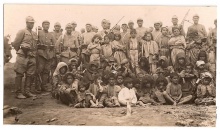The radical left which during the military dictatorship rose in arms (paying a heavy price) has been alimenting itself mainly from the ranks of the Alevi community. The war waged by the junta against the Kurds with the most dirty of methods including mass eviction and dam projects in East Anatolia evoked a large migration to Western Turkey’s metropolis – in addition to the economic factors which pushes the population in the entire global south into the cities. Millions of uprooted and impoverished Alevis all of a sudden found themselves within an urban environment.
The Alevis have been known as social rebels. They staged several insurrections against the Ottoman Sultans leading to bloody crack-downs. They remained heavily oppressed different to other ethnic and sectarian minorities 1, especially to Christian-orthodox Greeks and Armenians who both de facto and de jure enjoyed a secured position also thanks to their powerful merchant classes. During the Kurdish uprising 1937/38 the Alevis were the driving force being heavily punished by the Kemalists. As the Alevis settle right at the border line between Turks and Kurds (Dersim which was renamed by the Kemalists to Tunceli), it is not by accident that they played a central role in the formation of the modern Kurdish national movement. Abdullah Öcalan and big chunks of the PKK’s leadership got Alevi background. They never mention or use that – quite the contrary. Therefore the Alevis remained in strong contradiction to the junta after their military coup in 1980.
A decisive change came about only with the ascent of the Sunni-Islamist movement. Right from the start Alevis have been anxious about them. Only very late being already under pressure the Kemalist generals grasped the potential of the Alevis to hamper Islamism. Under AKP rule the Alevis moved more and more towards the Kemalists and secularism still without a significant sectarian momentum. A striking example is the constitutional referendum of 2010 by which the AKP successfully curbed the military’s power. The province in which the No scored by far the best result with 81% was actually Tunceli. The rich western provinces of white Turkey followed with respectable distance. Second best came with 74% Kırklareli on the Black sea bordering Bulgaria. On the national level, however, only 42% voted for No allowing the AK a sweeping victory. But also among the Kurds a deep rift occurred. In no predominately Kurdish provinces (except Tunceli) the No exceeded 10%. (Important to know that the PKK called for boycott rendering the turnout in several Kurdish districts very meagre.) It is hence not by accident that the person which was entrusted with saving the Kemalist CHP party from sinking is an Alevi Kurd hailing from … Dersim, namely Kemal Kılıçdaroğlu.
Today the Alevis, amounting to 10-20% of the total population, by their vast majority are poised against the AKP government siding with the Gezi movement. Especially on the Syrian question they refuse Erdoğan’s aggressive interventionist stance and tend to support Assad. An aspect of sectarian solidarity with their Arab Allawi relatives can hardly be denied.
As a matter of fact the revolutionary left historically recruited largely from the Alevi milieu. Based only on this very milieu it will not be possible to bring down the Turkish capitalist elite which remains strongly seated in its saddle. It is to be expected that the Islamists in case of troubles will use the confessional differentiation as armour. It is quite possible that a sectarian conflict will be provoked following the Arab pattern and especially the Syrian one. A revolutionary left must not tap into this trap and cannot reciprocate. The task is to decompose, to split the political, social and cultural AKP bloc along democratic and social criteria nipping sectarianism in the bud.
By now it should be clear why a revolution based only on Alevis is not possible and would transform into a cultural, communal clash (maybe hidden behind secularism). The power of the capitalist elite can only be shaken if a significant section of the mass following of the AKP moves against them. Only if the social revolutionaries rally behind them important parts of the Sunni poor they can overcome their defensive. But this itinerary is long, very long.
- 1. These characterisations might be inappropriate as the employed notions are connected to the period of globalising capitalism and imperialism

